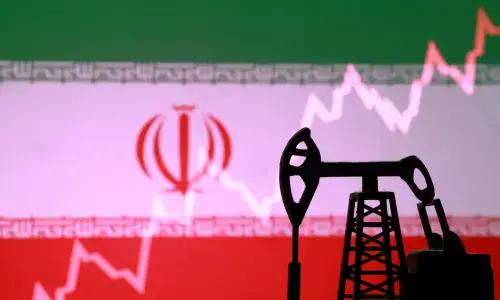THE member states of the Shanghai Cooperation Organisation were displeased with India’s decision to host their 22nd summit virtually instead of in person. This decision was widely interpreted as a deliberate strategy to prevent inviting the Pakistani prime minister to Delhi and to convey a message to the US. Furthermore, it was perceived as an effort to transform the SCO into an organisation similar to the South Asian Association for Regional Cooperation (Saarc).
The primary objective of establishing Saarc was to enhance economic and cultural cooperation in the South Asian region. It was agreed that the forum should not be utilised for discussing bilateral disputes. However, this optimistic expectation was shattered as Saarc members blamed India and Pakistan for the failure of this initiative. With the inclusion of India and Pakistan in the SCO, a sense of hope arose that both nations would eventually normalise relations, thereby fostering mutual interdependence. The SCO’s potential for collaboration in security and counterterrorism was seen as an opportunity to influence the Pakistan-India relationship positively. Unfortunately, both countries have let down the Central Asian states, Russia and China thus far.
India has been accused of using the SCO platform for political purposes. The last virtual forum, in which Indian Prime Minister Narendra Modi repeated his allegations of cross-border terrorism and the CPEC route going through the Gilgit-Baltistan region, is an example. Although there is little substance to these allegations, India keeps using this narrative as an excuse to avoid dialogue with Pakistan. However, exploiting regional forums for this purpose is not beneficial to the regional initiative and will not favour India.
The failure of regional forums pushes states towards bilateral and multilateral engagements for cooperation. China has initiated several such initiatives, including trilateral initiatives with Iran, Pakistan and Afghanistan and a quadrilateral initiative that includes Uzbekistan. These initiatives align with several objectives of the SCO. India is also seeking alternatives to regional forums, like Bimstec (Bay of Bengal Initiative for Multi-Sectoral Technical and Economic Cooperation). However, alternative or parallel platforms cause distractions and waste diplomatic vigour.
The failure of regional forums pushes states towards bilateral and multilateral engagement.
In the manner of the ‘Asean way’ of consensus politics, regional forums are struggling to produce results. These forums still hold the potential for broader cooperation in the security, economic and political domains. As for the SCO, there is a need to develop synergy in the expectations of its member states.
For this purpose, the SCO established a public diplomacy channel headquartered in Tashkent to build trust among member states. The centre’s mandate focuses on expanding cultural and humanitarian ties between member states, facilitating mutual visits of delegations, and fostering friendly relations between civil society institutions. However, India and Pakistan are the least active members of the forum.
The cases of India and Pakistan differ. India might have political objectives in not engaging in public diplomacy at the SCO level in order to avoid enhancing its interaction with Pakistan. But India has already developed multilayered economic, defence and strategic relationships with the Central Asian states and made significant inroads into Central Asia’s educational institutes, think tanks, and media. Bollywood has also helped boost India’s soft image.
Pakistan’s case is different, as it still carries the image of a state supporting the Afghan Taliban. It needs to correct this image and to utilise opportunities. The bureaucratic structure of the Foreign Office, political influences and the divergent priorities of security institutions make Pakistan’s case complex.
It is intriguing that the Foreign Office, like other ministries, is good at keeping its records updated. For instance, the Ministry of Foreign Affairs has a dedicated public diplomacy division to foster engagement with various entities. However, the outcomes of these efforts are limited to paperwork and are without tangible results.
The Pakistani Foreign Office has conspicuously focused on image cultivation, often overshadowing the substantive needs of the country. This skewed priority was glaringly evident when former prime minister Imran Khan criticised Pakistani diplomats for their alleged treatment of overseas Pakistanis. Instead of using the criticism as an opportunity to introspect, the diplomatic community resisted the feedback, seeing it as compromising a polished image.
The dichotomy is even more glaring when we consider the performance of Pakistani foreign missions in the economic and cultural sectors. A common perception is that these missions fall short of their expected role in these areas. Pakistani embassies primarily concentrate on protocol-related tasks, largely overlooking their role in the host countries’ academic, cultural and social activities. The conspicuous absence of Pakistani diplomats in such activities not only results in missed opportunities for enriching cross-cultural exchanges and academic dialogues but also adds to a perception of isolation.
Pakistani diplomats have shown a marked disinterest in connecting with local or visiting Pakistani scholars at embassies. In stark contrast, their proficiency in providing protocol to state officials and politicians is notable. This selective approach underscores a profound imbalance in their duties, favouring ceremonial procedures over substantial tasks. Pakistani diplomats have mastered the art of professional appearances. There is an urgent call for them to embrace a more comprehensive and substantive approach, moving beyond the restrictive boundaries of protocol.
In an interesting development, despite all its political and strategic priorities, Uzbekistan has established a dedicated Urdu language department in a university, aiming to enhance cultural cooperation with Pakistan. Surprisingly, most faculty members in the department have never travelled to Pakistan, yet they frequently visit India. If questioned, the relevant authority might point to Central Asian study centres in a few public universities in Pakistan, but doubts may arise regarding their actual contribution. While the Foreign Office complains about resource constraints, it also needs to provide a satisfactory explanation regarding professional ethics and dedication to their assigned work.
The SCO still provides an opportunity, depending on how effectively Pakistan can engage with the forum.
The writer is a security analyst.
Published in Dawn, July 16th, 2023































